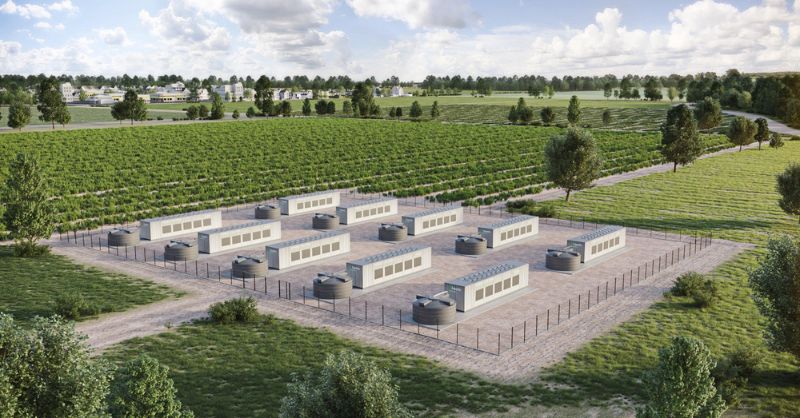
Water scarcity remains one of the most pressing global challenges, affecting over 2 billion people worldwide. In response to this crisis, Aquaria, a New York-based startup, has secured $112 million to develop and deploy scalable water solutions that extract water directly from the atmosphere.
By combining advanced technology with a focus on sustainability, Aquaria aims to reshape the way communities and industries access potable water, positioning itself as a key player in addressing global water shortages.
In a related topic about sustainable startups, we also reported about how Solubag raised $4.5M to develop water-soluble alternative to single-use plastics. It’s an interesting read too.
What problem is the startup trying to solve
Aquaria’s core innovation lies in its atmospheric water generators (AWGs), which harness water from ambient air using patented heat exchange and thermal material technologies. These systems are designed to be modular and scalable, similar to battery deployments, and can be implemented in residential, commercial, and industrial settings. Aquaria’s vision includes creating “Hydrogrids,” which are atmospheric water systems comparable to solar farms, capable of providing water for entire communities or industries.
“Our air not only supplies us with the oxygen we need to breathe, it provides us with the essential water we need to survive,” said Brian Sheng, co-founder and CEO of Aquaria. “We envision a world where Aquaria supplies entire cities with water from the sky.”
To date, Aquaria has constructed the first homes globally that rely entirely on atmospheric water for their water supply. Their flagship project, a 1,000-home community in Hawaii, integrates solar power and batteries to address the energy challenges often faced in isolated regions.
Expanding water access across diverse sectors
Aquaria is not solely focused on residential projects. The company is actively exploring partnerships in sectors that face significant water access challenges, such as green hydrogen production, mining, and data centers, often located in remote areas where traditional infrastructure is unfeasible.
These projects represent a middle ground between inefficient water trucking and prohibitively expensive large-scale water systems. Aquaria’s modular technology provides a flexible alternative, with rapid deployment timelines that outpace conventional methods.
With $100 million in project financing secured from Upwell Water, Aquaria offers partners pay-over-time agreements, mirroring the financing models used in the solar industry. This approach lowers the financial barriers to adoption and accelerates the rollout of atmospheric water technology.
“Upwell Water is pleased to support Aquaria with capital and teamed solutions to deliver decentralised water to communities,” said Dr. Hu Fleming, President of Upwell Water’s Treatment division. “We note the improvement of the cost of delivered water in the atmospheric water generation segment, and look forward to contributing to meet Aquaria’s growing customer demand.”
Aquaria’s technology is gaining traction in regions experiencing severe water crises. In Southeast Asia, where water scarcity is compounded by the effects of climate change, the company’s solutions offer a lifeline. Mistletoe, one of Aquaria’s investors, emphasises the importance of this approach.
“Southeast Asia is facing a climate crisis, in which water access is a core issue. We’re happy to help bring Aquaria’s sustainable technology solutions to counter the water crisis in Asia,” said Taizo Son of Mistletoe.
Aquaria’s focus on sustainability aligns with broader efforts to combat climate change and reduce reliance on depleting freshwater sources. By integrating its AWGs with renewable energy sources like solar, the company ensures its water production systems are environmentally friendly and adaptable to diverse conditions.
Bridging the U.S. infrastructure gap
In the United States, water infrastructure is aging and ill-equipped to handle the growing challenges of drought and contamination. According to the American Society of Civil Engineers, U.S. water infrastructure currently receives a dismal C- rating. Aquaria’s technology offers a promising alternative to traditional systems that are costly and slow to build.
Former House Majority Leader Dick Gephardt underscored the importance of innovative solutions like Aquaria’s in addressing these challenges:
“America is the leader in innovation in many diverse sectors, and we must approach our efforts to combat climate change and sustainability issues with the same vigor and eagerness that we have in technology, space, AI and more. I truly believe that Aquaria has built an innovative technology that will solve the water challenges that are so prevalent in this country.”
How is the company balancing optimism with practical challenges
While Aquaria’s technology presents a compelling vision for sustainable water access, it faces challenges. Scaling atmospheric water generation (AWG) to meet the needs of entire cities will require significant advancements in efficiency and cost reduction. Critics also point to the high energy demands of AWGs, particularly in arid regions where humidity is low.
However, Aquaria is addressing these concerns by incorporating renewable energy into its designs and focusing on regions where AWGs are most efficient. The company has partnered with experts like Stanford University’s Mark Jacobson to explore innovations in integrating energy and water systems, ensuring its technology evolves to meet practical demands.
What do we think about the startup
Aquaria’s efforts come at a critical time. As of November 2024, nearly 42% of the United States is experiencing drought conditions, with similar issues plaguing regions across the globe. By leveraging atmospheric water, the company is contributing to a more resilient and decentralised approach to water infrastructure.
While the journey to large-scale implementation is fraught with technical and financial hurdles, Aquaria’s vision and growing partnerships indicate a step forward in addressing the world’s water crisis. For now, its innovative approach offers hope to communities and industries struggling to secure a stable water supply.
The post From air to tap: Aquaria pockets $112M funding to address global water crisis appeared first on Tech Funding News.
